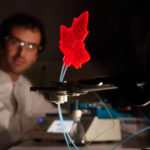 Researchers from the Eindhoven University of Technology have reportedly developed a leaf-inspired mini-factory to produce drugs using solar energy. The team’s work could allow medicine to be made in resource-deprived areas, as long as there is sunlight.
Researchers from the Eindhoven University of Technology have reportedly developed a leaf-inspired mini-factory to produce drugs using solar energy. The team’s work could allow medicine to be made in resource-deprived areas, as long as there is sunlight.
“Theoretically, you could use this device to make drug compounds with solar energy anywhere you want,” lead researcher Timothy Noël said, according to Reuters.
Using luminescent solar concentrators, the artificial leaf mimics nature and efficiently harvests solar radiation. Liquid is pumped through tiny channels, exposing molecules to sunlight with enough intensity to kick-start a chemical reaction.
The team said in a statement that removing the need for a power grid could one day enable researchers to make malaria drugs in the jungle or medicines on Mars.
This is not the 1st biomimetic device or product that makes use of a process found in nature. Pfizer (NYSE:PFE) and Protaliz Biotherapeutics made a drug for a rare genetic condition known as Gaucher disease using genetically modified carrot cells. Other research teams are growing crops that have been genetically bred to produce medicines and vaccines in their leaves, Reuters reported.
The artificial leaf will still work in places with cloudy skies and even though each small unit relies on micro-channels, Noël believes researchers could link the devices together and increase production.
“Even an experiment on a cloudy day demonstrated that the chemical production was 40 percent higher than in a similar experiment without LSC material,” Noël said in the University’s press release. “We still see plenty of possibilities for improvement. We now have a powerful tool at our disposal that enables the sustainable, sunlight-based production of valuable chemical products like drugs or crop protection agents.”
Noël told the news outlet that the process could become available to chemical engineers within 5 to 10 years.

